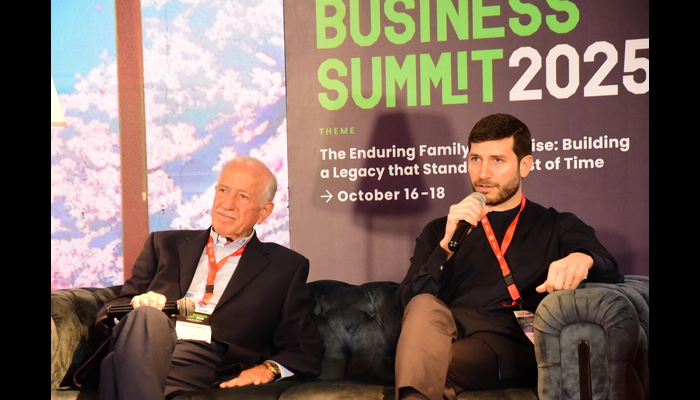Ninety-nine years after landing in Nigeria through Mohammed El-Khalil, the El-Khalil family has built a legacy in Nigeria, with the Seven-Up Bottling Company.
Currently, the company is led by Sari El-Khalil, Mohammed’s grandson, who serves as the Managing Director and Faysal El-Khalil, Mohammed’s son, as the board Chairman.
Faysal and Sari featured during the fireside chat at the Family Business Summit 2025, organised by PwC in conjunction with BusinessDay. Speaking during the chat, they provided insights into how they have built one of the biggest family businesses in Nigeria.
Faysal, who served as MD of SevenUp from 1978 to 2005, put the age of the business at 65. He said, “The first bottle from our factory rolled out on the 1st of October 1960. So, we celebrate two anniversaries on the 1st of October every year.”
Read Also: SBC: 65 years serving Nigeria – Businessday NG
Sari commenced the conversation, providing a detailed summary of his grandfather’s sojourn to Nigeria. He highlighted that in the early years of the 20th century, when Lebanon was still under Ottoman rule, Mohammed El-Khalil set out in search of a better life. This trip took him to Mexico, where he encountered life’s difficulties. However, on a trip back to Lebanon, he landed in Marseille, France where he encountered a Lebanese couple.
According to Sari, a Lebanese couple instructed Mohammed, “You must go to Nigeria, you will find gold on the sides of the streets.”
In 1926, he landed in Nigeria.
The older Faysal continued the story. Like many newcomers at the time in Nigeria, Mohammed began in trading, buying bales of textiles and selling them in Lagos. Success in those days meant expanding into Balogun Street or Martin Street, and Mohammed was determined to get there.
Through discipline, thrift, and persistence, his trading business flourished. By 1927, he diversified into road transport, launching a venture that would, over time, become the largest privately owned transport company in West Africa.
Even as his business expanded, Mohammed remained deeply connected to his roots. He returned to Lebanon, where he met and married his wife. Though much of his time was spent in Nigeria, together they raised eight children, six boys and two girls. Several of them were born in Nigeria, reflecting the deep bond the family maintained with the country that had become their second home.
As the older children completed their education abroad, the family began to see a new chapter unfolding. By the late 1950s, when his eldest son Anwar returned to Nigeria, Mohammed realised it was time to diversify once again. This decision marked the beginning of the family’s transition from trading and transport into new sectors, a shift that would eventually lead to the creation of Seven-Up Bottling Company.
For Sari El-Khalil, the current MD of the company, the story of Seven-Up is also the story of home. “I’ve spent most of my life in Nigeria,” he said. “I grew up here, son of the soil.”
Long before he carried an executive title, Sari’s earliest memories were not of boardrooms, but of trucks and bottling lines. As a boy, he noted that he would return from school to the company’s offices in Ijora, Lagos, running around the yard, trying to change the oil of trucks, and occasionally joining door-to-door sales teams.
Read Also: El-Khalil comes in as MD Seven-Up Bottling Company – Businessday NG
“Even when I was in Lebanon,” he recalled, “I’d come back for the summers. And instead of partying with my friends, I’d get on the trucks and do sales. It’s been in my blood since I was very young, part of my DNA.”
But that early exposure didn’t translate into entitlement. After earning his undergraduate degree in Boston, Sari returned to Nigeria for a five-year internship in the company. “The plan was always to go back for an MBA, get higher education, and then come back,” he said. “But my mentor at the time advised me to step out, to see something different.”
That advice changed everything. Sari worked abroad for five years with PepsiCo, gaining first-hand corporate experience outside the family ecosystem. “It was the best decision,” he reflected. “It helped me understand what it means to work in a structured corporate environment, to be accountable, to earn your place. And at the same time, it made me appreciate even more what it means to own something, the difference between being an employee and being an owner.”
When he finally returned to Seven-Up, it wasn’t out of obligation, but conviction. “It was never forced,” he said. “I was given choices, and it led me back here.”
For all its decades of expansion and commercial success, Faysal recounts that the El-Khalil story is not just about building factories, securing distribution networks, or selling soft drinks. It is also a story about family, about how the bonds that built a business can just as easily be tested by it.
After establishing Seven-Up Bottling Company and steering it into one of Nigeria’s most recognised consumer brands, he noted that the first generation of the El-Khalil family faced a governance challenge.
“Some founders fall into what we call the founder’s trap,” he reflected, recalling the early years after their father’s passing. “Our eldest brother, who led Seven-Up, became a sort of second founder. He was a visionary, but he didn’t want to let go.”
That tension, between continuity and change, shaped much of the company’s evolution. Faysal noted that, like many family businesses, questions arose about who should lead: was it by seniority or by merit? How long should one remain in the office? Should pay and influence be tied to bloodlines or to performance?
Out of this came a resolve to create what they called the family constitution, a detailed playbook to define how the family and the business would coexist. It outlined governance rules, leadership succession, retirement ages, and even boundaries for those who could join the enterprise.

